TAI JI MEN CASE AND
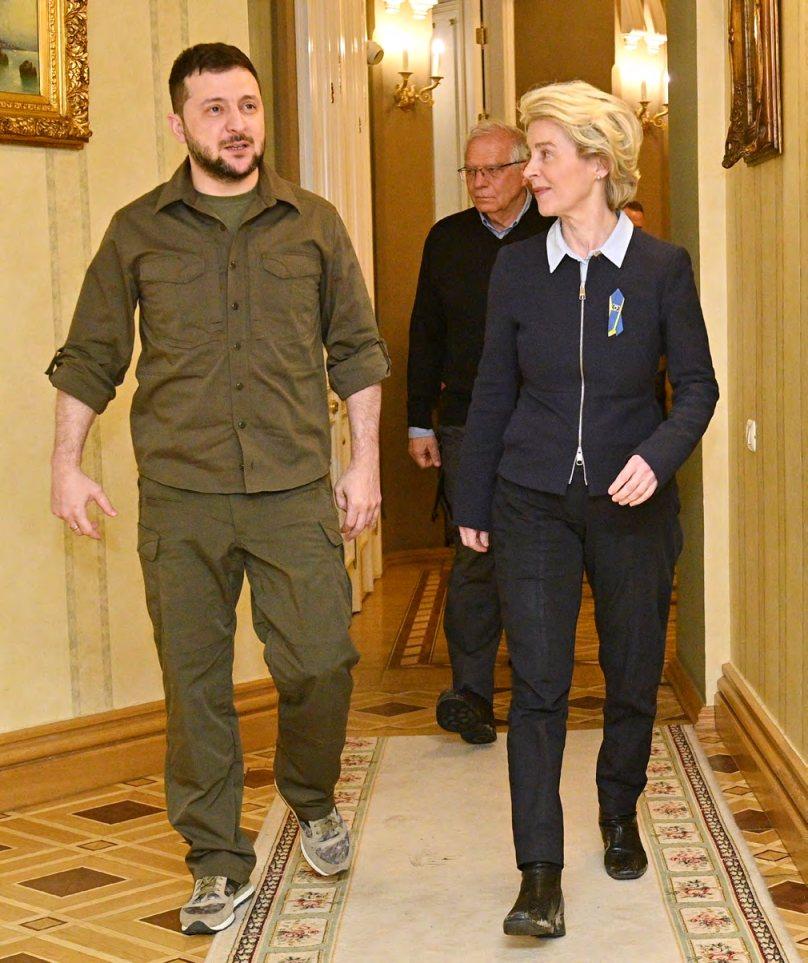

SPAIN, SPECIAL EDITION, MAY 2022 SPECIAL EDITION ● WWW.EUROPEANTIMES.NEWS ● 20 PAGES ● FREE “HUNTING PACIFISTS FOR THE POLICE IN RUSSIA” RADICALIZATION PAGE 14 RELIGIOUS FREEDOM IN SHARP DECLINE FAITH & RIGHTS, PAGE 12 MAY 9TH EUROPE DAY EUROPE, PAGE 3 COUNCIL OF EUROPE: MENTAL HEALTH & HUMAN RIGHTS - THE BATTLE CONTINUES EUROPE, PAGE 4 AN OFFICIAL START FOR A EUROPEAN UKRAINE “UKRAINIAN PEOPLE ARE HOLDING UP THE TORCH OF FREEDOM FOR ALL OF US” URSULA VON DER LEYEN [GO TO PAGE 4] It is the worst of times when the ghosts of aggression and war rear their ugly heads again. It is the age of foolishness when many believe propaganda aimed at blaming the victim rather than the aggressor. It is the epoch of incredulity when we lose faith that good can ultimately prevail. It is a season of darkness when cities are bombed and children are killed in an unprovoked war. It is a winter of despair when millions of refugees leave everything and come to European Union countries in tears. But at the same time it is the best of times when Europe and the world wake up and ... See page 10
EUROPEAN VALUES Volodymyr Zelensky, on the left, and Ursula von der Leyen, Copyright European Union, 2022 - Photographer:
Christophe Licoppe
The Hubble telescope detects the most distant star: Eärendel See page 8
CHIEF EDITOR
Dr. Petar Gramatikov
Contributing Team:
Juan Sánchez Gil
Robert Johnson
Gaston de Persigny
João Ruy Faustino
Charlie W. Grease
Willy Fautré
Jan Leonid Bornstein
© 2022 The European Times News. F-MV-CS. All rights reserved, The European Times is a trademark registered in Spain.
Calle Puerta de abajo 16 Alpedrete 28430 Madrid contact@europeantimes.news
The European Times is an online newspaper with a Spanish view on globlal and European matters. On certain occasions we may do special paper editions.

We accept external contributions specially from members of civil society, that otherwise are not given a space.
The European Times NEWS aims to cover news that matter to increase the awareness of citizens all around geographical Europe. Here you find the facts that many don´t dare to publish. The opinions that many try to hide. If you have news that you want to be known, this is a place. We have a strict policy against fake news.
DISCLAIMER OPINIONS: The opinions of the authors or reproduced in the articles are the ones of those stating them and it is their own responsibility. Should you find any incorrections you can always contact the newsdesk to seek a correction or right of replay.
Images belong to their author, owners or licencees.
Global Volunteer



2
OUR TEAM AND AIMS THE EUROPEAN TIMES • MAY 2022 Join us for our
Day, on Saturday 14th of May ! As you may know, Serve the City is an international movement with organisations spread all over the world. On the Global Volunteer Day, all the Serve the City organisations, from Ireland to Australia, gather and spread kindness on the same day, in their respective cities, at the same time. So join us to be a part of our global volunteering movement! Choose the project that you like from the list in our app at www.ServeNow.App to participate!
UPCOMING DATE EUROPE DAY: MAY 9TH THE MOMENT THAT CHANGED EUROPE FOREVER
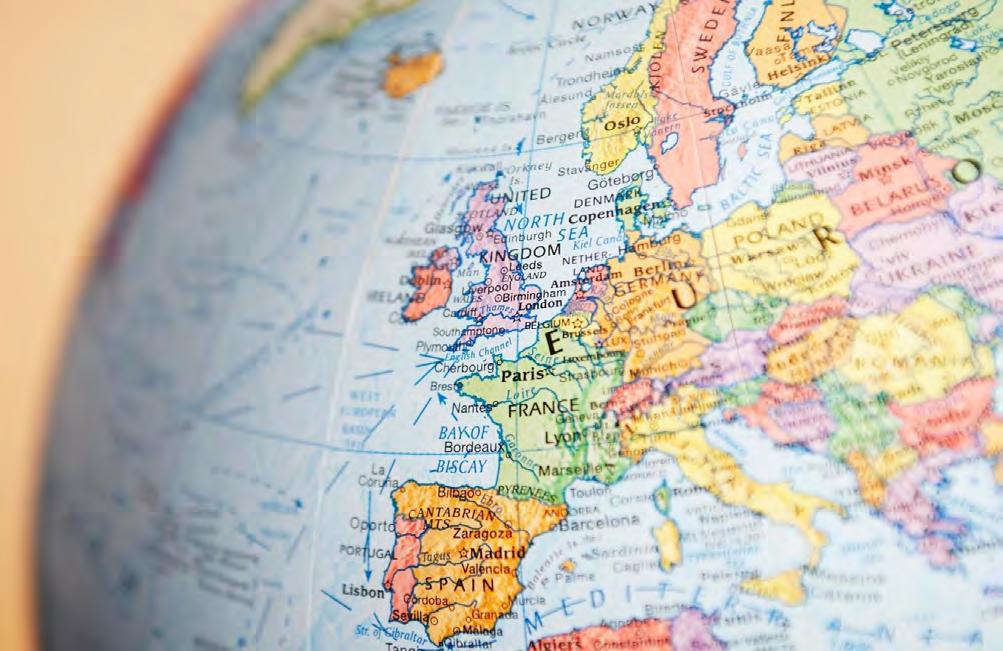 Photo by Martin Bekerman on Unsplash
By Petar Gramatikov Chief Editor
Photo by Martin Bekerman on Unsplash
By Petar Gramatikov Chief Editor

Next month, throughout the European Union (EU) will be celebrated one of the most important dates, for its symbolism, in European History. The 9th of May (or Europe Day, as it is commonly called) sets the moment on which, the then French Minister of Foreign Affairs, Robert Schuman, proposed the creation of a supranational organization at a European scale to regulate energy and share common resources (coal and steel). On this day, the World knew the intentions to create the European Coal and Steel Community (ECSC) and the intentions to change the European landscape forever.
The “Schuman Declaration” marked one of the most important moments of the last century. The proposal to create an international organization was more than a mere attempt of economic collaboration between two devastated countries. The ECSC represented the first step towards European integration, which two main goals were pursued: European unity among Member States in all aspects; and the security and defense of Europe at the beginning of a Cold War. The creation of the ECSC represented a pragmatic proposal at the
time, with ambitious and avant-garde responses. With this project, the aim was, above all, “a European pacification that would have an organized and living Europe as a foundation”, because, according to Robert Schuman, “the lack of it (an organized Europe) would only lead to a new war”. Interestingly, we find that what was a simple argument at the time has become an indisputable fact during these years. Ever since the creation of ECSC, European countries have become accustomed to a climate of peacefulness unmatched in the entire history of Europe! So far, the EU has lived more than 70 years in peace between the Member States, who, in the past, were fierce rivals.
To accomplish these goals, the european leaders found a solution that would boost cooperation. Furthermore, they see on coal and steel the chance to recover Europe from ashes, supervised by a supranational authority (that would act independently and composed by independent personalities chosen by governments), and open to accept every country that would be willing to join, in equal conditions, towards a European Community. Hence, Belgium, Luxembourg, Italy, and Netherlands decided to join this organization with the aim to reach an European Federation.
After the Declaration, it was Jean Monnet who decided to handle with negotiations, in June 1950, between all interested governments. The negotiations were a success and he could manage with all technical requirements and interests
of all parts, and put above all things the idea of a united Europe and the benefits for all people.
The ECSC was a true sectorial federal entity without a federal constitution. The agreements were made by the governments but needed to be accepted by the national parliaments. The treaty which legitimate the organization had a period of 50 years which ended in 22 july 2002. Jean Monnet was the 1st president of the High Authority (the supranational authority).
As Robert Schumann said on the same day, “this Europe will not be made all at once, nor in a joint construction, but in concrete achievements”. And indeed, from the time of the Schuman Declaration to the present day, much has changed.
The international organization is no longer limited only to the energy policies and brings together a wide range of essential economic sectors for society, such as the support for agricultural, fishing, or public health sectors; the commitment to education is undeniable and the creation and development of infrastructure capable of promoting greater economic, social and territorial cohesion throughout the economic zone far exceeds the values practiced until then; borders are removed and markets (physical and digital) are integrated, allowing an increase in the flow of trade and, in this way, bringing a range of choices and differentiated items to the tables of European citizens that would, otherwise, be completely impossible;
from a European Parliament with national deputies to a hemicycle democratically elected by European citizens, legitimately representing their voice at European level; from concerns on the environment and biodiversity to reinforcing the call for a more sustainable Europe at all levels. For this reason, celebrating the 9 May it is much more than celebrating the creation of the EU. There is not much information about the 9 May celebrations for this year. The European Commission doesn’t disclose any official information on how they will celebrate the Europe Day this year. The only institution that disclosed something about this year’s commemorations was the European Economic and Social Committee, which intend to do several activities that include a youth engagement and a Plant a tree event, but there is not much more information than this, at the moment.
Notwithstanding, we can foresee that most activities will focus on European Year of Youth, and on events to promote peace and claim support for Ukraine
Furthermore, we ask your attention to the fact that 9 may celebrations will not end in european institutions and in Brussels. All EU will celebrate as well with several events organized by civil society or by the Europe Direct Network Centers (a decentralized network of the European Commission) that are spread across the EU regions. You can join these events and celebrate this special date very near to your home.
■
3
EUROPEANTIMES.NEWS • MAY 2022
EUROPE
OF EUROPE
THE BATTLE FOR HUMAN RIGHTS IN MENTAL HEALTH CONTINUES
By T.H.
The decision-making body of the Council has started its review process of a controversial drafted text that aim at protecting human rights and dignity of persons who are subjected to coercive measures in psychiatry.
The text however has been the subject of widespread and consistent criticism since the work on it started several years ago.
The United Nations human rights mechanism has pointed to the legal incompatibility with an existing UN human rights convention, that outlaw the use of these discriminatory and potentially abusive and humiliating practices in psychiatry.
UN human rights experts have expressed a shock that the Council of Europe with the work on this new legal instrument that allows the use of these practices under certain conditions might “reverse all positive developments in Europe”.
This criticism has been strengthened by voices within the Council of Europe itself, the EU Fundamental Rights Agency, international disability and mental health groups and many others.
Mr Mårten Ehnberg, the Swedish member of the decision-making body of the Council of Europe, called the Committee of Ministers, told The European Times: “The views regarding the compatibility of the draft with the UN Convention on the Rights of Persons with Disabilities (CRPD) are of course of great importance.”
“CRPD is the most comprehensive instrument protecting the rights of persons with disabilities. It is also the starting point for the Swedish disability policy,” he added.
He stressed that Sweden is a strong supporter and advocate for the full enjoyment of human rights by persons with disabilities, including the right to effectively and fully participate in political and public life on an equal basis with others.
Discrimination on the grounds of disability should not occur
Mr Mårten Ehnberg noted that “Discrimination on the grounds of disability should not occur anywhere in society. Health care must be offered to everyone based on need and on equal terms. Care must be provided with
respect of the individual patient’s needs. This is of course also applicable regarding psychiatric care.”
With this he puts his finger on the sore spot. The UN Committee on the Rights of Persons with Disabilities –the UN Committee that monitors the implementation of the CRPD – during the first part of the drafting process of this possible new legal text of the Council of Europe issued a written statement to the Council of Europe. The Committee stated that:
“The Committee would like to highlight that involuntary placement or institutionalization of all persons with disabilities, and particularly of persons with intellectual or psychosocial disabilities, including persons with ‘‘mental disorders’’, is outlawed in international law by virtue of “article 14 of the Convention, and constitutes arbitrary and discriminatory deprivation of liberty of persons with disabilities as it is carried out on the basis of actual or perceived impairment.”
To make any doubts on the question whether this concern all coercive psychiatric treatment, the UN Committee added:
“The Committee would like to recall that involuntary institutionalization and involuntary treatment, which are grounded on therapeutic or medical necessity, do not constitute measures for protecting the human rights of persons with disabilities, but they are an infringement of persons with disabilities’ rights to liberty and security and their right to physical and mental integrity.”
Parliamentary assembly opposed
The UN does not stand alone. Mr Mårten Ehnberg told The European Times that “The Council of Europe’s work with the current drafted text (additional protocol) has previously been opposed by, inter alia, the Parliament of the Council of Europe (PACE), which on two occasions has recommended the Committee of Ministers to withdraw the proposal to draw up this protocol, on the basis that such an instrument, according to PACE, would be incompatible with the member states’ human rights obligations.”
Mr Mårten Ehnberg to this noted, that the Council of Europe’s Committee of Ministers in turn had stated that “the utmost should be done to promote alternatives to involuntary measures but that such measures nevertheless, subject to strict protective conditions, may be justified in exceptional situations where there is a risk of serious damage to the health of the person concerned or to
others.”
With this he quoted a statement that had been formulated in 2011, and has been used since by those who speak in favour of the drafted legal text.
It was originally formulated as part of the initial consideration whether a Council of Europe text regulating the use of coercive measures in psychiatry would be necessary or not.
During this early phase of the deliberation a Statement on the United Nations Convention on the Rights of Persons with Disabilities was drafted by the Council of Europe Committee on Bioethics. While seemingly concerning the CRPD the statement however factually only considers the Committee’s own Convention, and its reference work – the European Convention on Human Rightsreferring to them as “international texts”.
The statement has been noted as rather deceptive. It lays out that the Council of Europe Committee on Bioethics considered the United Nations Convention on the rights of persons with disabilities, particularly whether articles 14, 15 and 17 were compatible with “the possibility to subject under certain conditions a person who has a mental disorder of a serious nature to involuntary placement or involuntary treatment, as foreseen in other national and international texts.” The statement then confirms this.
Comparative text on the key point in the statement of the Committee on Bioethics however, show it in reality does not consider the CRPD’s text or spirit, but only text straight out of the Committee’s own convention:
The Council of Europe Committee’s Statement on the Convention of the Rights of Persons with Disabilities says: “Involuntary treatment or placement may only be justified, in connection with a mental disorder of a serious nature, if from the absence of treatment or placement serious harm is likely to result to the person’s health or to a third party.”
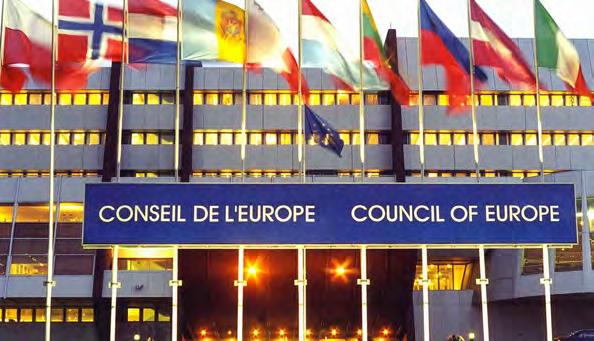
Convention on Human Rights and Biomedicine, Article 7 states: “Subject to protective conditions prescribed by law, including supervisory, control and appeal procedures, a person who has a mental disorder of a serious nature may
be subjected, without his or her consent, to an intervention aimed at treating his or her mental disorder only where, without such treatment, serious harm is likely to result to his or her health.”
Further preparation of the drafted text
Mr Mårten Ehnberg, said that during the continued preparations, Sweden will continue to monitor that the necessary protective principles are upheld.
He stressed that, “It is not acceptable if compulsory care is used in a way that means that persons with disabilities, including psychosocial disabilities, are discriminated against and treated in an unacceptable way.”
He added that the Swedish Government is highly committed, both nationally and internationally, to further improve the enjoyment of human rights by persons with mental ill-health and disabilities, including psychosocial disabilities, as well as to promote the development of voluntary, community-based support and services.
He finished off noting, that the Swedish Government’s work regarding the rights of persons with disabilities will continue unabated.
In Finland the government also follow the process closely. Ms Krista Oinonen, Director of the Unit for Human Rights Courts and Conventions, Ministry for Foreign Affairs told The European Times, that: “Throughout the drafting process, Finland has also sought a constructive dialogue with civil society actors, and the Government is keeping Parliament duly informed. The Government has lately organised an extensive round of consultations among a large group of relevant authorities, CSOs and human rights actors.”
Ms Krista Oinonen could not give a conclusive viewpoint on the drafted possible legal text, as in Finland, the discussion about the draft text is still ongoing.
■
4
THE EUROPEAN TIMES • MAY 2022 COUNCIL
Statement by President von der Leyen with Ukrainian President Zelenskyy at the occasion of the President’s visit to Kyiv
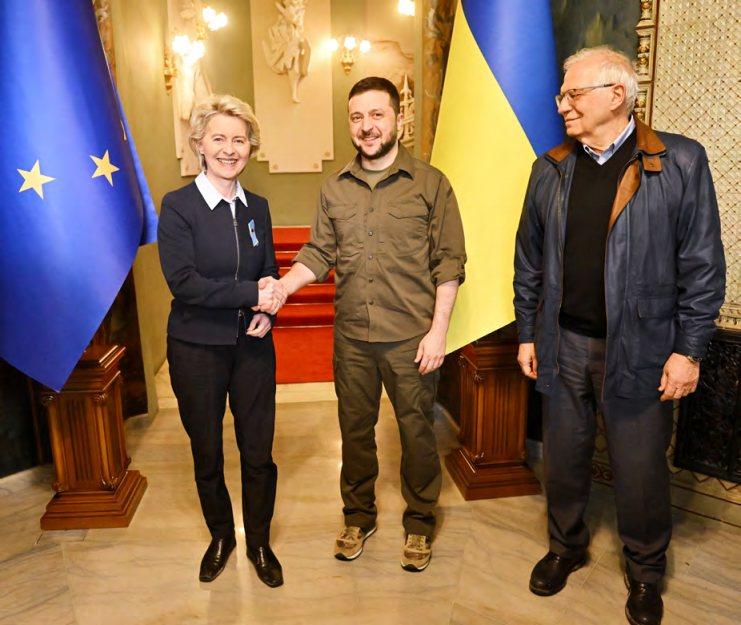
“UKRAINIAN PEOPLE ARE HOLDING UP THE TORCH OF FREEDOM FOR ALL OF US”
Letme start by saying that the missile attack this morning on a train station used for evacuations of civilians is despicable. I am appalled by the loss of life and I offer my deep condolences to the families of the victims and all of those who lost loved ones.
It was important to start my visit in Bucha today. Because in Bucha our humanity was shattered. And it is right and just that the world voted to suspend Russia from the Human Rights Council. This war is a challenge for the entire international community. And this is a decisive moment. Will heinous devastation win or humanity prevail? Will the right of might dominate or is it the rule of law? Will there be constant conflict and struggle or a future of common prosperity?
Your fight is our fight. I am here with you in Kyiv today to tell you that Europe is on your side. This is the message, dear Volodymyr, I want to bring to the Ukrainian people today.
We just discussed how to step it up Europe’s support. Let me be clear: We can never match the sacrifice of the Ukrainian people. But we are mobilising our economic power to make Putin pay a heavy price. We have imposed five waves of unprecedented sanctions against Russia. And we are already preparing the next wave. We are now moving into a system of rolling sanctions. And these sanctions are biting hard. Exports in goods to Russia have fallen almost 71%.
Inflation is around 20% – and rising. Businesses confidence in Russia is at its lowest level since 1995. And the best and brightest minds are leaving the country, together with more than 700 private companies.
On top of this, Member States have already frozen EUR 225 billion of private Russian assets in the EU since the beginning of the war. Russia will decent in economic, financial and technological decay. While Ukraine is marching towards a European future.
We stand with you as you defend your country.
This is my second point.
Ukrainian people are holding up the torch of freedom for all of us.
The European Union is sending weapons to your country.
We have allocated EUR 1 billion from the European Peace Facility to support the Ukrainian Armed Forces. And more will come. I am grateful the High Representative will now propose another EUR 500 million. In addition, EU Member States are delivering military equipment on an unprecedented scale. Slovakia is a shining example for that. With this we
support the brave Ukrainian soldiers, fighting for Ukraine´s freedom. And for everyone’s freedom.
Third, we are strengthening our financial help for Ukraine. Today, we are delivering on EUR 1 billion of support. This sum consists of three different financial packages. As we speak, we are transferring EUR 120 million in budget support. We will make available the EUR 330 million from our emergency package now. Both are grants.
And we are accelerating the second half of the macro-financial assistance package with EUR 600 million.
Fourth, we are with Ukrainians as they seek refuge within our borders.
And I promise you: We will take good care of them until it is safe to return home.
Home to a free and prosperous Ukraine. We make sure, that they have access to housing, schools, medical care and work. The brave people of Ukraine deserve nothing less. Together with Prime Minister, Justin Trudeau, of Canada we are convening a pledging event in Warsaw tomorrow. We call our campaign ‘Stand up for Ukraine’. We will mobilise
support for people fleeing the war inside and outside Ukraine. This campaign is yet another proof that Ukraine´s cause today is the world´s cause.
Finally, we are with you as you dream of Europe. Dear Volodymyr, my message today is clear: Ukraine belongs in the European family. We have heard your request, loud and clear. And today, we are here to give you a first, positive answer. In this envelope, dear Volodymyr, there is an important step towards EU membership. This questionnaire is the basis for our discussion in the coming months. This is where your path towards the European Union begins.
We will be at your disposal 24 hours a day, 7 days a week to work on this common basis. Ukraine is a friend, we know this very well. Ukraine shares our values.
And due to our association agreement, Ukraine is already closely aligned with our Union. So we will accelerate this process as much as we can, while ensuring that all conditions are respected.
On the first day of your mandate, dear Volodymyr, you said: ‘We have chosen Europe as our direction. But Europe’, you said, ‘Europe is not somewhere else. Europe is here in our mind. And when Europe is in our mind, then Europe will come to our country too.’
Today, more than ever, Europe is here. Europe is with you.” . ■
5EUROPE
“Thank you, dear Volodymyr,
EUROPEANTIMES.NEWS • MAY 2022
We will be at your disposal 24 hours a day, 7 days a week to work on this common basis. Ukraine is a friend, we know this very well. Ukraine shares our values.
Image credits: © European Union 2022 - Author: Christophe Licoppe
HEALTH & RIGHTS
COERCIVE MEASURES: WHAT IS THE CURRENT SITUATION? CHANGING LAWS FOR THE RESPECT OF HUMAN RIGHTS
By Nicola Di Giulio President of the City Council of Lausanne

Every day, in Europe and worldwide, there are victims of involuntary commitment and coercive treatments. These go, from the administration of electroshocks to psychotropic drugs with serious side effects.
It is worrying to see that these victims struggle to have their rights respected!
Few know that in May 2021, UN human rights experts called on the Council of Europe to repel legislation on mental health coercive measures. The statement published on the United Nations High Commissioner’s website reads:
“Overwhelming evidence from the European Disability Forum, Mental Health Europe, and other organizations and growing consensus within the United
Nations, including at the World Health Organization, show that forced admission to medical institutions and coercive treatments in institutions will bring harmful effects such as pain, trauma, humiliation, shame, stigmatization, and fear to people with psychosocial disabilities... UN rights experts call on the Council of Europe to stop legislation for coercive mental health measures”.
A dark history
early 60,000 teenagers and children were victims of involuntary commitment until 1981 only in Switzerland. In regards to women, some were locked up in prison facilities. Others were subject to forced labour, marriage, and sterilization. Almost all interned women were subjected to sexual violence. 648 institutions were involved in these commitments.
The press informed in August 2021, that Australia would compensate the “stolen generation” of Aborigines and islanders who had been placed in institutions or foster families.
Thousands of children were victims of these coercive and harmful measures between 1910 and 1970! That is recognition for these people!
Psychiatric evaluations: a convenient tool?

There are other tragic situations. In May 2019, a parent group was created in Geneva. A hundred parents, all in the process of divorce, had lost custody of their children following a psychiatric evaluation. In May 2021, the European Court of Human Rights condemned Italy. Migrant women, victims of human trafficking, have their custody rights taken away because they are not considered ‘good mothers.”
Let us not repeat the same errors.
These witness reports affect me because I myself was a victim of those coercive measures. But, as I have specified on various occasions, I do not blame the State. There was recognition, but the
pain remains about the human rights violations!
I thank the editorial staff of “The European Times” for allowing me to express myself on these matters in its columns. We must speak about it!
Our authorities and governments must act now so that the involuntary commitment law is modified and even repealed! No coercive measures should exist!
We should not forget that all of us are affected by these laws, which, unfortunately, open the door to interpretation.
We are ourselves affected by these laws. How can we accept that they get applied to us, our children, our families and our loved ones?
If we do not do anything now about it, what will we have later on in our conscience?
Let us act for human dignity!. ■
WHO and public health champions around the world are marking World No Tobacco Day (WNTD) this year by focusing on the many ways in which tobacco threatens the environment we live in.
The 2022 global campaign aims to raise public awareness about the environmental impact of the entire tobacco cycle, from its cultivation,
production and distribution to the toxic waste it generates. The campaign will also aim to expose the tobacco industry’s effort to greenwash its reputation and to make its products more appealing by marketing them as environmentally friendly.
Tobacco use damaging at every stage
From start to finish, the tobacco life cycle is an overwhelmingly polluting and damaging process. Air pollution caused by smoking springs to mind, but damage occurs across the entire supply chain, and is much more complex.
Across the globe around 3.5 million hectares of land are destroyed to grow tobacco each year. Growing tobacco also contributes to the deforestation of 200 000 hectares a year and soil degradation.
Tobacco production depletes the planet of water, fossil fuel and metal resources.
Globalization of the tobacco supply chain and sales means the tobacco industry relies heavily on resource-intensive modes of transport.
4.5 trillion cigarette butts are not disposed of properly every year across the globe, generating 1.69 billion pounds of toxic waste and releasing thousands of chemicals into the air, water and soil.
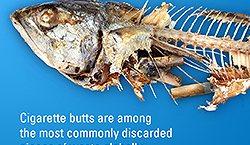
Stronger policies needed Consumers have become more environmentally conscious and they are choosing more sustainable products. The tobacco corporations, among others, have made environmental sustainability an integral pillar of their corporate
social responsibility (CSR) strategies and adopted several greenwashing practices. These include beach clean-ups and marketing new products as eco-friendly to divert public attention away from their own environmentally damaging actions.
The WNTD 2022 campaign calls on governments and policy-makers to step up legislation, including implementing and strengthening existing schemes to make producers responsible for the environmental and economic costs of dealing with tobacco waste products. WHO also recommends that countries fully ban tobacco advertising, promotion and sponsorship, including advertising CSR programmes, in accordance with the Framework Convention on Tobacco Control (WHO FCTC).
■
6
WORLD NO TOBACCO DAY 2022 (MAY 31): TOBACCO’S THREAT TO OUR ENVIRONMENT THE EUROPEAN TIMES • MAY 2022
EUROPEANS, ALCOHOL AND LIFEHOOD
treatment and a person can remain at increased risk of relapse for many years.
In 1913 the writer Jack London was writing about the users:
“John Barleycorn [the alcohol] extinguishes their flame, quenches their agility, and when he does not kill them or drive them mad right away, he turns them into heavy, coarse beings, twisting and distorting their original goodness and the fineness of their nature“.
Alcohol metabolism
FRANCE - Dr. CM. Alcohol (ethanol or ethyl alcohol) is a substance resulting from the natural fermentation of grain, sugar juices or plants and ripe fruits, already known and practised for a very long time in human history. The pure alcohol is a colorless liquid very inflammable and highly miscible with water. Its semi-developed formula is CH3-CH2-OH or C2H5OH.
Boiling Point: 78.37°C
Melting point: -114.1°C
Density = 0.7893
Considering the natural life, not only humans but also animals from the elephant to the little monkey are experimenting in sub-Saharian Africa the psychotropic effects of alcohol with fermented fruits (such as of Marula tree) resulting in a drunk behavior too.
Alcohol as all addictive substances has powerful effects on the human brain with progressive changes in its structure and function. Indeed, the initial effect makes the users to experience the most often euphoric and pleasurable feelings that motivate people to use again those substances despite the numerous risks, generally unknown by the users, of significant harms.
Studies of adolescents show that extended alcohol use is associated with a 10% reduction in the size of the hippocampus area of the brain responsible for memory and learning.
On the reward system (located in the limbic area) that motivates to survive, to take actions, and then brings pleasure, the alcohol consumption results in raising the levels of the neurotransmitter dopamine and other proteins. This end up in transforming the controlled and occasional alcohol use into an impaired control on the drinking. With repeated drug use, the reward system of the brain becomes subservient to the need for the drug by action on the executive area in the prefrontal cortex, from where impulsions are controlled, decisions planned and then put into execution. And ultimately this is leading to addiction.
Alcohol Effects
Among the symptoms resulting of alcohol harms are a desinhibition in the social behavior, problems of concentration and memory, confusion, loss of coordination with impaired motor skills, aggressiveness, injuries on the workplace, dizziness, double vision, drowsiness, road accidents, slurred speech, lethargy and also anxiety.

A long term use leads to serious health degradation with cardiovascular problems, increased blood pressure, stroke, pancreas and liver (cirrhosis and fibrosis) problems, impaired cell tissue regeneration of the kidneys, weak immune system, depression, seizures, coma, suicidal thoughts, and death by overdose.
The binge drinking of the youths :
For a blood alcohol concentration higher than 0.8 gr/l in less than 2 hours, i.e. an intake of at least 5 glasses for boys and 4 for girls, studies from 2016 show neuroinflammatory phenomena responsible for brain damage that could persist in the very long term, with more severe consequences for the girls.
In addition:
Alcohol is a genotoxic agent that cause DNA damage increasing the risks of cancers of the mouth, œsophagus, larynx, pharynx, liver, colon, rectum and for the women, the breast cancer.
In a pregnant woman the alcohol is crossing the placental barrier and thus is able to alter the developing nervous system of the embryo and fœtus.
In the case of a mother breastfeeding, the baby got with the milk the same concentration of alcohol than for the mother blood! This is causing the Fetal Alcohol Spectrum Disorders, and also is one cause of the Sudden Infant Death Syndrome.
We can (more or less) revert but... These brain changes persist long after an individual stops using alcohol, producing craving for the substance that can lead to relapse in more than 60% of people treated within the first year after
The alcohol is soluble in water (so in blood) and has also affinity for the fat tissue of the body including the white matter of the brain (the axons of the neurons). This explains the fast reach of the highly vascularized brain and also the lungs, kidneys and the liver a key detoxifying organ.
Regardless of the amount consumed (one glass contains about 10 gr of alcohol) the liver can only metabolize a limited amount of 11-15 mg of alcohol per hour, enabling the excess of alcohol to circulate in the body. About only 10% of the consumed alcohol will be eliminated by the kidneys in urine and by the lungs with breathing. This is currently used for alcohol testing.
The oxidation of alcohol consists in three main steps :
1) in the liver, alcohol is oxidized by the enzyme alcohol dehydrogenase (ADH) in acetaldehyde (very toxic and causing the hangover), in presence of nicotinamide adenine dinucleotide (NAD) derived from Vitamine B3,
2) always in the liver, the acetaldehyde is oxidized in acetate by the enzyme aldehyde dehydrogenase (ALDH) in presence of NAD,
3) the acetate is now transformed in Acetyl CoA as for the main nutrients (carbohydrates, lipids and proteins) resulting in CO2 eliminated by breath, in fatty acids, in ketone bodies (when an excess of fatty acids), and cholesterol.
In Europe
According the 2019 Report of European School Survey Project on Alcohol and other Drugs (ESPAD), the youth consider alcoholic beverages (spirits, beer, wine, premixed drinks and cider) to be easy to obtain compared with other illegal substances. Between 1995 and 2019, an overall increase in heavy episodic drinking can be noted among girls (from 30% to 34%) and a decrease among boys (from 41% to 36%), narrowing the gender difference over time.
The World Health Organization (WHO) 2019 Report has found that one in every four deaths among young adults was
caused by alcohol, due to injury.
Dr Carina Ferreira-Borges, of WHO regional office for Europe, said: “When alcohol is one of the biggest killers of our young people, we cannot afford to be complacent. This is a product that is repeatedly marketed and made available to youth despite evidence that alcohol consumption has a detrimental effect on brain development and physical health. This is the next generation of leaders and we must protect them.”
Based on the 2019 figures from Eurostat, 8,4% of Europeans drink alcohol on a daily basis, 28,8% weekly and 22,8% monthly. This represents 8,7 liters per year per person across the countries of the Organisation for Economic Cooperation and Development (OECD). And alcohol is responsible for more than 290 000 deaths, representing 5,5% of all deaths.
For adults, a study made by the European Monitoring Centre for Drugs and Drug Addiction (EMCDDA) revealed that among the injured or killed drivers, the most responsible substance was alcohol alone followed by alcohol combined with another substance.
In 2019 alone, by road accidents there were 23 000 deaths and 120 000 serious injuries.
In 2020, the number of deaths amounted to 42 per million inhabitants in the 27 countries of the European Union. According to an European Commission study, alcohol is estimated to be involved in around 25 % of all road fatalities, leading the European Commission recommendations (2021-2030) to include a zero-tolerance drink-driving limit toward the « Zero deaths » by 2050.
In conclusion
If alcohol use may cause human body and mental harms during all key sensitive periods of life with prenatal alcohol exposure, adolescent binge drinking, illnesses and overdoses all along adulthood, serious education and prevention programs have to be better developed at governmental and educational levels, starting with the youth but also involving the parents, and in partnerships with Non-Governmental Organisations (NGOs) and associations that show the truth about drugs (and alcohol is a drug). This is already enshrined in the International and European Conventions but not forcefully applied facing the lobbies. Similarly successfully evidenced alcohol and drug rehabilitation programs, specially which dont use other drugs as substitutes, must be broadly applied toward a full recovery, not for a simple and useless harm reduction, and of course with no one left behind!
Don’t Ruin Your Life With Alcohol, Stay Safe! ■ 7
HEALTH & RIGHTSEUROPEANTIMES.NEWS • MAY 2022
SCIENCE
THE HUBBLE TELESCOPE DETECTS THE MOST DISTANT STAR: EÄRENDEL
SINC. The galaxy that hosts the star Eärendel has been magnified and distorted by gravitational lensing / NASA, ESA, B. Welch (JHU), D. Coe (STScI), A. Pagan (STScI) - B. Welch et al./Nature

An international team of astronomers, led by Brian Welch of Johns Hopkins University (USA) and with the participation of researchers from CSIC and the University of the Basque Country, has detected Eärendel, the most distant star ever observed. The finding is published in the journal Nature.
“Eärendel existed in the first billion years of the universe, during the big bang, and its light has travelled 12.9 billion years to reach
Earth,” explains one of the authors, José María Diego, a researcher at the Institute of Physics of Cantabria (IFCA, CSIC-UC).
The star no longer exists, it exploded millions of years ago, but its light was so powerful that it is still visible and has been detected by the Hubble space telescope.
It shone when the universe was young, only a billion years after the big bang (which occurred 13.8 billion years ago) and was much more massive and brighter than the Sun.
The discovery of Eärendel far surpasses the discovery of the most distant star observed to date: Icarus, detected in 2018 by the Hubble space telescope
9 billion light years away. It also opens a window into the early universe and the origin of the first star formations.
“Its discovery is a great leap back in time compared to the previous record of Icarus; it allows us to go much further back to the origin of the universe,” says Diego, “in fact, Eärendel is the most distant star we know of, even though it no longer exists. It exploded a long time ago, but we still see the light coming from it. We have been able to detect it because it is magnified by a cluster of galaxies; otherwise it would be impossible”.
The star is named after the poem The Voyage of Eärendel, the Evening Star,
8
The star Eärendel, named after a poem by Tolkien, existed when the universe was young, but disappeared after a huge explosion. However, its light has travelled 12.9 billion years until it has now been detected on Earth. The discovery beats the previous distance record held by Icarus, another star also observed by Hubble but 9 billion light years away
The galaxy that hosts the star Eärendel has been magnified and distorted by gravitational lensing / NASA, ESA, B. Welch (JHU), D. Coe (STScI), A. Pagan (STScI) - B. Welch et al./Nature
”The discovery of Eärendel, whose light took 12.9 billion years to arrive, far surpasses the discovery of the most distant star ever observed: Icarus, detected by Hubble 9 billion light years away”
THE EUROPEAN TIMES • MAY 2022
written in 1914 by John Ronald Reuel Tolkien, author of The Lord of the Rings, who was inspired by Anglo-Saxon mythology.
A star amplified by gravitational lensing
As the universe expands, light from distant objects is stretched or shifted to longer wavelengths as they approach Earth. So far, the objects observed at such a large distance respond to star clusters embedded within the first galaxies.
“Normally, at these distances, galaxies look like tiny blobs, because the light from millions of stars is mixed together,” says Diego, “and the galaxy that hosts Eärendel has been magnified and distorted by gravitational lensing.
“Just as a curved glass distorts the image when we look through it, a gravitational lens amplifies the light from very distant objects lined up behind a cluster of galaxies. It is these galaxies that bend the light from distant stars because their enormous mass warps the space-time around them,” explains the researcher. The team estimates that Eärendel would be at least 50 times the mass of the Sun, and much brighter than the Sun, rivalling the most massive stars known.
“These primordial stars (which form from the elements that were forged shortly after the big bang: hydrogen, helium and small amounts of lithium) have so
far eluded observers, but could now be detected if observed through highmagnification gravitational lensing, as in the case of Eärendel,” says Welch.
“They are first generation and we hardly knew anything about them. From now on, with stars like this, we will be able to study them in detail with telescopes like
Instituto de Astrofísica de Andalucía (IAACSIC) and co-author Yolanda Jiménez Teja explains that “to predict whether the brightness of Eärendel will be maintained in the coming years or whether it is temporary, we need to estimate the mass of all the stars that are in the line of sight between us and Eärendel”.
“Webb’s images and spectra will allow us to confirm that Eärendel is indeed a star and to constrain its age, temperature, mass and radius,” explains Diego. Welch adds that “combining the Hubble and Webb observations will also allow us to learn about microlensing in the galaxy cluster, which could include exotic objects such as primordial black holes”.
In addition, the telescope will be able to learn more about the composition of this star, a topic of particular interest to astronomers because it formed before the universe was filled with heavy elements, produced by several generations of massive stars.
“We will learn many things: we will get the spectrum, that is, the fingerprint of a star, it will tell us how old it is, how long ago it was born, how long it was alive when it emitted the light we see now, its metallicity or the elements that compose it,” concludes Diego. ■
the James Webb. In fact, there is already a NASA-approved observing programme that we are participating in,” he adds.


“Studying Eärendel will be a window into an era of the universe that we are not familiar with, but which led to everything we know. It’s as if we’ve been reading an interesting book, but we started in the second chapter and now we have the opportunity to see how it all began,” Welch adds.
For her part, the researcher at the
The expected contribution from James Webb
Since the data suggest that the star’s brightness will continue for years, the next step would be to study it with the James Webb Space Telescope. The astronomers hope that by 2022 Eärendel will be able to be seen in increasing magnification with this observatory, launched at the end of 2021 and led by the US, European and Canadian space agencies (NASA/ ESA/CSA).
9
Hubble Space Telescope, with which the star Eärendel was detected. / NASA
“to predict whether the brightness of Eärendel will be maintained in the coming years or whether it is temporary, we need to estimate the mass of all the stars that are in the line of sight between us and Eärendel”
SCIENCEEUROPEANTIMES.NEWS • MAY 2022
THE TAI JI MEN CASE AND
A Test for Democratic
“It was the best of times, it was the worst of times, it was the age of wisdom, it was the age of foolishness, it was the epoch of belief, it was the epoch of incredulity, it was the season of light, it was the season of darkness, it was the spring of hope, it was the winter of despair.”
So famously wrote Charles Dickens in “A Tale of Two Cities,” and his words apply to our present situation as well.
By Massimo Introvigne.

Editor-in-Chief of Bitterwinter.org Italian sociologist of religions. He is the founder and managing director of the Center for Studies on New Religions (CESNUR), an international network of scholars who study new religious movements. Introvigne is the author of some 70 books and more than 100 articles in the ield of sociology of religion.
Itis the worst of times when the ghosts of aggression and war rear their ugly heads again. It is the age of foolishness when many believe propaganda aimed at blaming the victim rather than the aggressor. It is the epoch of incredulity when we lose faith that good can ultimately prevail. It is a season of darkness when cities are bombed and children are killed in an unprovoked war. It is a winter of despair when millions of refugees leave everything and come to European Union countries in tears.
But at the same time it is the best of times when Europe and the world wake up and discover how precious is the fragile achievement of democracy. It is an age of wisdom when in Europe we all understand we have tolerated human rights violations for too long. It is an epoch of belief when we cherish the hope that we will overcome war and tyrants as we were able to overcome a pandemic. A season of light and a spring of hope will dispel darkness and despair if we, the Europeans, understand that it is our values that will carry the day in the end, and not in Europe only.
Taiwan is also at the center of global concerns, and they affect Europe as we saw when we all had to stand in solidarity with Lithuania after it was sanctioned for its friendship with the Taiwanese. Defending Taiwan is not about economic ties, as important as they may be, it is about values. Either Europe is a community founded in a shared heritage of defending democracy and human rights or there is no Europe.
SOME PROBLEMS OF TAIWAN’S DEMOCRACY
While we defend the right of the Taiwanese to freely choose their government and their model of international relations, as European friends we should also look at what in Taiwan’s democracy is still open to a dangerous criticism by its enemies. As the Bible says in the Book of Proverbs, “A truly good friend will openly correct you.”
As the current President of Taiwan has acknowledged, two main problems there are corruption and transitional justice. Although anticorruption plans have been implemented, Taiwan still ranks comparatively high in global statistics about corruption. Among the most corrupt sectors of Taiwan’s bureaucracy is the National Taxation Bureau (NTB). One of the reasons is that tax bureaucrats receive high bonuses when they enforce tax bills against taxpayers. This creates a powerful incentive to issue high tax bills and quickly enforce them and pocket the bonuses, whether they are right or wrong.
Corruption is a typical problem of societies that transition from authoritarian to post-authoritarian political systems. Old habits die hard, and bureaucrats who were accustomed to be almost omnipotent are not happy to relinquish their power.
This is the problem of “transitional justice.” A true transitional justice implies that when an authoritarian regime is replaced by a democratic one, past violations of human rights are publicly acknowledged, perpetrators are brought to justice, laws are reformed, and victims are indemnified.
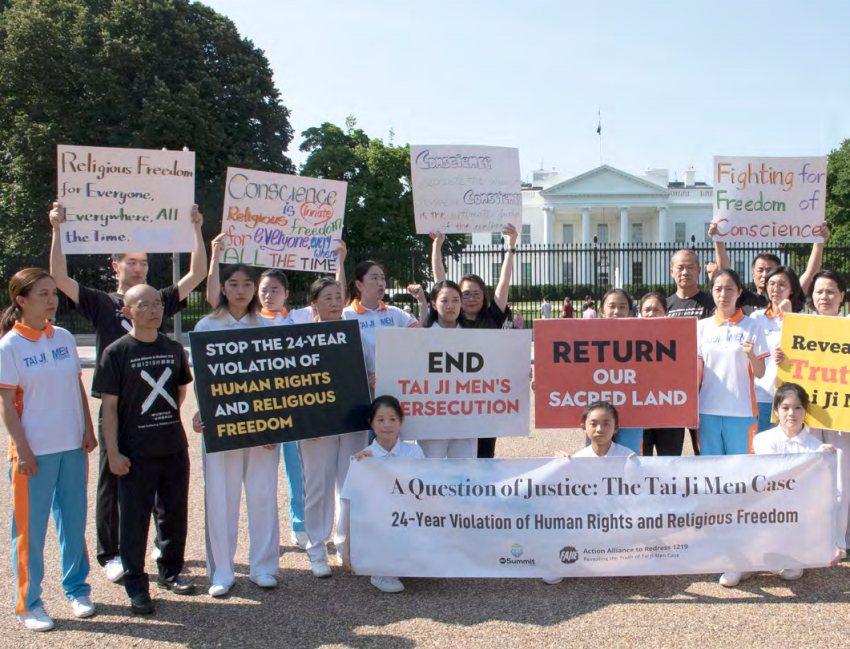
The experience of many European countries proves that transition from an authoritarian to a democratic regime does not happen overnight.
In Taiwan, Martial Law was abolished on July 15, 1987. But this did not mean that the next day Taiwan became a full-blown democracy. The party that was in power in 1987 remained in power and controlled the presidency or the Parliament until the first party rotation in 2000. This obviously made transitional justice difficult.
10
Tai Ji Men members protest in front of the White House, U.S.A. in July 2021
“The Tai Ji Men case is not about money. Tai Ji Men did not settle for a reason of conscience and values.”
It is time for the European Taiwanese authorities that we we expect it to solve its justice, and freedom of The Tai Ji Men case would The time is now, “the worst of
FOREIGN AFFAIRS THE EUROPEAN TIMES • MAY 2022
AND EUROPEAN VALUES:
Democratic Taiwan
THE TAI JI MEN CASE
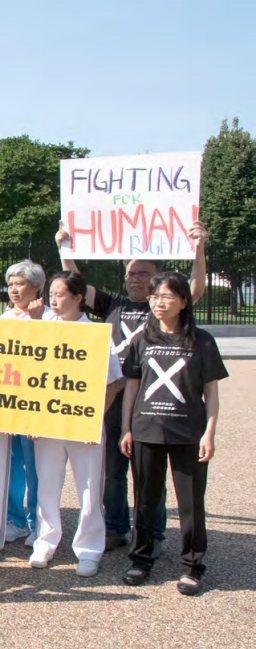
Those who have visited Taiwan recently may have noticed massive protests in the streets of Taipei, where thousands call for tax reform and transitional justice in a case concerning a spiritual movement, Tai Ji Men, a “menpai” (similar to a school) of qigong, martial arts, and self-cultivation rooted in esoteric Taoism but open to disciples (dizi) of all faiths, whose Grand Master (Shifu) is Dr. Hong Tao-Tze,
Dr. Hong also promotes high profile initiatives for a culture of conscience and world peace, and brought traditional Tai Ji Men culture abroad through over three thousand cultural events and martial arts performances, many of which were held in Europe.

Tai Ji Men’s efforts have been highly praised by international political and spiritual authorities, including different Presidents of Taiwan.
Notwithstanding this praise, Tai Ji Men has been a victim of a campaign of repression that targeted in 1996 several spiritual movements in Taiwan, accused during the post-authoritarian phase of the island’s history of not supporting the candidate who won in that year the first Taiwanese presidential elections. Notwithstanding its caution in not taking political sides, Tai Ji Men was also involved in the crackdown, and Dr Hong was arrested together with his wife and two dizi.
Dr. Hong was falsely, and ridiculously, accused by a prosecutor, who violated the law and abused his authority, of “religious fraud” and even of “raising goblins,” a practice totally foreign to Tai Ji Men. To this, an accusation of tax evasion was added, with fabricated arguments.
On July 13, 2007, the criminal division of the Supreme Court of Taiwan pronounced the final acquittal of Tai Ji Men defendants, declaring them innocent of all charges, including tax evasion. National compensation for the wrongful detention was given to Dr. Hong and his co-defendants who had been detained.
This should have been the end of the Tai Ji Men case. However, some NTB bureaucrats decided to ignore the court decision and go on with their
unjustified tax evasion action. They also knew that they could pocket significant bonuses by issuing tax bills against a large movement such as Tai Ji Men.
Even after the Supreme Court had concluded that Dr. Hong had committed no crimes, and there was no tax evasion, they tried to maintain their tax bills for the years 1991 to 1996, claiming that the money Dr. Hong had received from dizi in the so-called “red envelopes” should not be considered as nontaxable gifts but as taxable tuition fees—even if the highest courts in Taiwan had declared they were not tuition fees.
In 2019, the NTB, in accordance with the rulings of the Supreme Administrative Court and the Taipei High Administrative Court, agreed that tax bills for the years 1991 and 1993 to 1996 should be corrected to zero, but maintained the tax bill for 1992, including penalties. Logically, this did not make sense, as the content of the red envelopes in 1992 was not different from the other years.
The NTB relied on a technicality, i.e., that for the year 1992, and only for that year, a decision by the Supreme Administrative Court rendered in 2006 had become final. It is a general principle of law that even final decisions can and should be revised or not enforced when a new fact intervenes, in this case the verdict of the criminal section of the Supreme Court of 2007 that found Dr. Hong and Tai Ji Men not guilty of tax evasion. Nonetheless, the NTB refused to cancel the tax bill for 1992.
On May 5 and July 23, 2020, the Taipei High Administrative Court wrote twice to the NTB for the Central Area, asking them to treat 1992 as the other years were treated. This, also, was to no avail. In August 2020, land belonging to Dr. Hong that had been seized was auctioned by the National Enforcement Agency, then confiscated after two auctions were not successful. This property was important for Tai Ji Men, which planned to build a center for self-cultivation on what they consider a sacred land. Massive protests and an international campaign supporting Tai Ji Men followed.
The Tai Ji Men case is not about money. Tai Ji Men spent in legal fees only more than it should have paid had it settled with the NTB. It did not settle for a reason of conscience and values. While protests are gaining international momentum, it is time for the European friends of Taiwan to tell the Taiwanese authorities that we admire and support Taiwan but we expect it to solve its human rights, transitional justice, and freedom of religion or belief problems. The Tai Ji Men case would be a good starting point. The time is now, “the worst of times” and “the best of times.”. ■
Tai Ji Men was invited to perform in front of the U.S. Capitol Building in March 2000
11
“As European friends of Taiwan we should also look at what in Taiwan’s democracy is still open to a dangerous criticism by its enemies”
European friends of Taiwan to tell the admire and support Taiwan but human rights, transitional religion or belief problems. would be a good starting point. of times” and “the best of times”.
FOREIGN AFFAIRSEUROPEANTIMES.NEWS • MAY 2022
FREEDOM OF RELIGION OR BELIEF IN SHARP DECLINE IN ASIA, A EUROPEAN PARLIAMENT REPORT SAYS
protecting freedom of religion or belief, as it is deteriorating in many countries. In EU policy, too often economic interests prevail over human rights commitments. Therefore, the European Commission must reappoint a Special Envoy for the promotion and protection for the freedom of religion or belief as soon as possible.“
Among them, is China, where forced Sinicisation is underway at the expense of Uyghur Muslims, Falun Gong practitioners, Christians and of course, Tibetan Buddhists.
On 22 March, MEPs Peter Van Dalen and Carlo Fidanza made public their 45-page report “The EU and Freedom of Religion or Belief 2017-2021” at the European Parliament in Brussels.
The report, which outlines the “state of the art of religious freedom in the world” and discusses the “European institutions’ actions to protect religious freedom”, was drafted in collaboration with some of the most important associations and NGOs in the sector, involving “representatives of various faiths, from Christian associations to Baha’is, Muslims and Jews”.
In addition to the co-chairs of the intergroup Peter VAN DALEN (EPP)
and Carlo FIDANZA (FdI- ECR) who opened the session, other speakers were Iannis Argyropoulos, Head of Unit for Asia-Pacific and South Asia Regional Affairs of the European External Action Service; Marcela Szymanski, editorin-chief of the ”Religious Freedom in the World” dossier at the Pontifical Foundation Aid to the Church in Need, Willy Fautre, Director of Human Rights Without Frontiers and Oksana Oleynikova, director of the Good Shepherd children’s home in Ukraine, who “updated the audience on the current situation in Ukraine.
Peter VAN DALEN, co-chair of the Intergroup since its inception ten years ago, started by saying that “The EU needs to enhance its efforts in promoting and
ECHR CONDEMNS BELGIUM FOR DISCRIMINATING AGAINST JEHOVAH’S WITNESSES
STRASBOURG/BRUSSELS. Failure to grant congregations of Jehovah’s Witnesses exemption from property tax in the Brussels-Capital Region since 2018 was discriminatory
ECHR 122 (2022) 05.04.2022
In the case of Assemblée Chrétienne Des Témoins de Jéhovah d’Anderlecht and Others v. Belgium (application no. 20165/20) the European Court of Human Rights held, unanimously, that there had been:
a violation of Article 14 (prohibition of discrimination) read in conjunction with Article 9 (freedom of thought, conscience and religion) of the European Convention on Human Rights and with Article 1 of Protocol No. 1 (protection of property) to the Convention.
The case concerned congregations of Jehovah’s Witnesses which complained of being denied exemption from payment of a property tax (précompte immobilier) in respect of properties in the Brussels-Capital Region used by them for religious worship. According to
an order of 23 November 2017 enacted by the legislature of the Brussels-Capital Region, as of the 2018 fiscal year the exemption applied only to “recognised religions”, a category that did not include the applicant congregations.
Co-chair Carlo FIDANZA recalled that among those persecuted for their faith, “over 360 million Christians experience a high level of persecution and discrimination. Today the eyes of the world are rightly focused on the martyrdom of Mariupol,” FIDANZA said, “but with this report, we want to turn the spotlight on another martyrdom that takes place every day in total indifference and which affects millions of believers.”
And FIDANZA added: “As Peter VAN DALEN said, in most countries, we can see that both a very dominant religious majority (often Islamic, e.g. Pakistan) or a rather authoritarian government (e.g. China) are the main drivers of persecution of religious minorities. Often we can also see a combination of these two (e.g. Iran, Turkey).”
The report of the FoRB intergroup highlights 11 countries that, according to the NGOs participating in the survey, are the countries where religious freedom is increasingly restricted.
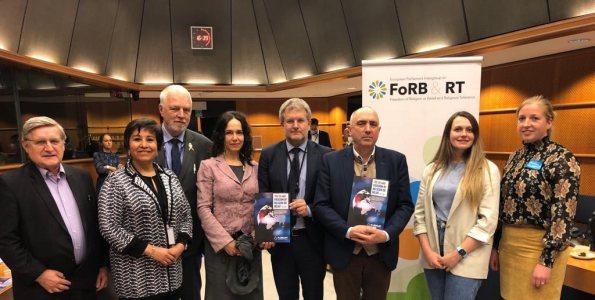
GERMANY’S FEDERAL ADMINISTRATIVE COURT PROTECTED SCIENTOLOGIST AGAINST DISCRIMINATION FROM CITY OF MUNICH
In Nigeria, President Buhari has worked to foster an Islamisation of the country, and Christians are mainly persecuted by jihadist groups such as Boko Haram, Iswap and local warlords.
In Pakistan, the majority of the Sunni population is aggressive towards nonMuslim minorities, and anti-blasphemy laws are often misused to settle scores with non-Muslim competitors in business.
Last but not least, the report of the Intergroup also points to Algeria, Myanmar, Eritrea, Vietnam and Turkey, where the deterioration of religious freedom goes on unabated year after year.
In the Q&A part of the launch event, MEP Carlo FIDANZA stressed that the Intergroup “will continue taking the initiative to address the situation of persecuted minorities worldwide” and “will keep pushing for a quick reappointment of a Special Envoy on Freedom of Religion or Belief outside the EU”, a position efficiently occupied by Jan Figel from 2016 to 2019, and left vacant since then… Where there is no political will, there is no way.
■
this type of “protective declaration”. She, therefore, brought the case to court.
Through different court levels, the case went all the way to the Federal Administrative Court, which in April 6 2022 ruled that “a municipality may not make the granting of a financial subsidy with which environmental policy objectives are pursued subject to the condition that the applicants submit a declaration distancing themselves from the Scientology organization.
The Court held that since the tax exemption in question was contingent on prior recognition, governed by rules that did not afford sufficient safeguards against discrimination, the difference in treatment to which the applicant congregations had been subjected had no reasonable and objective justification. It noted, among other points, that recognition was only possible on the initiative of the Minister of Justice and depended thereafter on the purely discretionary decision of the legislature. A system of this kind entailed an inherent risk of arbitrariness, and religious communities could not reasonably be expected, in order to claim entitlement to the tax exemption in issue, to submit to a process that was not based on minimum guarantees of fairness and did not guarantee an objective assessment of their claims.
MUNICH. A German self-employed artist wished to benefit, like many others, from a grant given by the City of Munich to acquire an eBike (pedelec) based on “Electromobility Funding Guidelines”. However, the city rejected the application for the sole reason of her beliefs, requiring her to reject them before being eligible for the grant. The applicant refused this and consequently the city discriminated against her by denying the subsidy.
When applying for this grant, she did not submit the “Declaration of Protection Concerning the Teachings of L. Ron Hubbard/Scientology” contained in the application form. By signing this declaration a grant recipient declares “not to apply the teachings of Scientology, nor to disseminate them and not to attend any courses or seminars of the organization”.
“Demanding declarations about one’s belief is not a matter for the local municipality” within the meaning of “Article 28 (2) of the German Basic Law”, stated the Federal Court, “therefore the defendant already lacks competence.
“If such a declaration is demanded and its refusal entails exclusion from funding, this purposefully interferes with the freedom of religion and belief guaranteed by Article 4 (1) and (2) of the Basic Law
“Therefore, the interference is unconstitutional for lack of a legal basis.
■
Being given the intolerable requirement of renouncing her religion to obtain the grant violated her basic rights, especially since no other faith or philosophy faced
Finally, the defendant’s [City of Munich] approach violates the general principle of equal treatment (Article 3 (1) of the Basic Law). It constitutes an inadmissible differentiation. Since all other requirements for funding are fulfilled, the defendant is obliged to grant the plaintiff a corresponding commitment.” ■
12
THE EU PARLIAMENT INTERGROUP ON FORB & RT PUBLISHED ITS 2017-2021 REPORT
FAITH & RIGHTS THE EUROPEAN TIMES • MAY 2022
& RIGHTS
OF DISTANT AND FORGOTTEN CONFLICTS, STORIES OF THE BELIEVERS OF A
By Carlo Fidanza.
Ever since the eyes of the world have turned to the conflict in Ukraine, it is difficult to speak of religious freedom.
First the COVID and then the war have hidden the minor but no less serious tragedies that are perpetuated in the rest of the globe, the suffering that continues to be perpetrated at the expense of the weakest.
For a moment, we realized what the state of the art on religious freedom was when last summer, NATO troops withdrew from Afghanistan, and suddenly we were plunged back into a dark time of segregation and discrimination. A time of persecution against those whose only fault is that they believe in their own God or because of their own being.
We realized that in certain parts of the world, being a woman or being a Christian, is still a guilt. This, for example, is the story of Zabi*, whose story was told to us by the NGO Open doors, the story of a young Afghan Christian woman who fled following the capture of the Taliban.

Zabi is a refugee who had to flee Afghanistan after the Taliban takeover. She’s single, still quite young and well-educated. She was active in the area of human rights and, therefore a target for the Taliban.
But being an activist and fighting for her ideals is not Zabi’s only fault.
Zabi has many sins, including that of being born a woman and a Christian.
The Taliban already know who she is and what she does because already five years ago, they killed her father for his faith, only after having tortured him for several months. And unfortunately, the tragedies for Zabi do not end here.
Only two years ago, her brother also disappeared. Like Zabi, he was a believer. We don’t know if she has other siblings, but Zabi’s mother is still alive. She’s not Christian.
The story of Zabi is not the only one
There are many other stories, very similar, stories that are lost in the speed of modernity and in a world where priorities are those that make it to the front page.
So, it is precisely these stories, those of which it is impossible to know the epilogue.
We know, for example, that many of these refugees, after the seizure of Kabul, fled to Pakistan in the hope of a better future. And that right here, they found themselves, if not in hell, certainly in purgatory.
Even in Pakistan, in fact, there is no rest for persecuted Christians.
With the intergroup, we managed to bring to the attention of European institutions, the infamy of the anti-
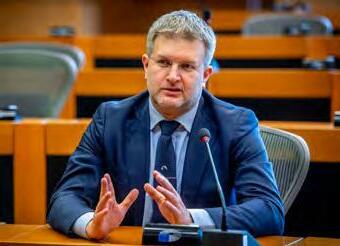
blasphemy laws that claim victims every day in this part of the world. Thanks to our actions, we have been able to save the couple Shafqat Emmanuel and Shagufta Kausar in prison for eight years, with the only fault of being Christians.
But that’s not enough.
The Intergroup receives reports on a daily basis, not least that of Shahzad Masih, for whom the Intergroup has made several moves to try to get a resolution on the agenda of the Parliament’s plenary session.
The story of Shahzad Masih was brought to the attention of the Intergroup by the NGO European Centre for Justice and Law. Shahzad is a 22-year-old young Christian man who has been in Pakistani prisons for five years, allegedly accused of being a blasphemer.
In 2017, while at work - at the time of the events Shahzad was working in a hospital as a janitor - Shahzad got into an argument with one of his Muslim colleagues. Shortly after the dispute, the situation escalated, and Shahzad was arrested.
From that moment, it also became impossible to get a date for a hearing. A hearing that to this day continues to be postponed.
There are several reasons why it is difficult to bring this case to the attention of European institutions and to have a hearing in Pakistani courts.
First of all, even before the recent developments in Pakistan, the situation regarding the blasphemy laws was
complex. The Pakistani administration itself is in fact, hostage to radicalized segments of the population that strenuously defend the anti-blasphemy laws and therefore fear that by freeing an alleged blasphemy offender, protests will arise.
At the European level, the intergroup does its best to carry on battles related to religion. However, it often encounters a relativist culture. A culture that permeates the European institution and that wants to relegate any discussion on religion to a merely private matter, not realizing that, by doing so, they are not even able to establish clear boundaries and limits for negotiations with third countries.
The hope, therefore, is that as soon as possible, the European institutions will awaken from this torpor and begin to make their full weight - political and economic - felt in these negotiations so that the lives of those who want to live in their own lands and who still look to this continent with hope, are protected. ■
Co-chair of the Intergroup on Freedom of Religion or Belief and Religious Tolerance of the European Parliament.
* Real name protected for security reasons FAITH
RELIGIOUS FREEDOM: STORIES
“LESSER GOD”
“[THERE IS] A CULTURE THAT PERMEATES THE EUROPEAN INSTITUTION AND THAT WANTS TO RELEGATE ANY DISCUSSION ON RELIGION TO A MERELY PRIVATE MATTER”
13EUROPEANTIMES.NEWS • MAY 2022
MOSCOW PATRIARCH KIRILL: WAR HAS A METAPHYSICAL SIGNIFICANCE AGAINST GAY PARADE
to the deterioration of the political situation in the Donbas”.
By Jan Leonid Bornstein
On March 6, 2022, Patriarch Kirill of Moscow and All Russia celebrated the Divine Liturgy at the Cathedral of Christ the Savior in Moscow.
At the end of the service, the Primate of the Russian Orthodox Church delivered a sermon.[1]
In his sermon, Kirill, who has already been heard several times defending and justifying war since the first day it started, has explained why “this spring has been overshadowed by grave events related
ANTI-CULT MOVEMENT HUNTING PACIFISTS FOR POLICE IN RUSSIA: BACK IN THE USSR
At the European Times, we have covered the long-time association between the anticult movement, the Russian Orthodox Church and the warmongers in the Kremlin.
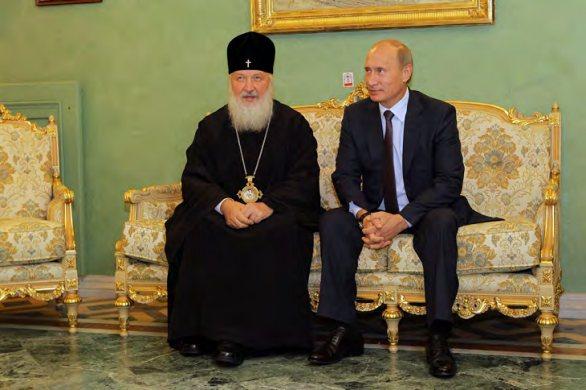
The piece we publish today shows that in current times, the anti-sectarians, as they call themselves, are working hand in hand with the FSB and other Russian law enforcement agencies, to hunt those Russians who would dare to share messages of peace while the war is ravaging Ukraine.
Below is the full translation of a call that has been posted on the website antisekta. ru, which is the official website of the Centre of Religious Studies – Saratov, headed by Alexander Kuzmin, a Russian Orthodox Priest.
This centre is a branch of another organization called Centre for Religious Studies in the name of Hieromartyr Irenaeus of Lyons, headed by Alexander Dvorkin, an Orthodox theologian who
has been criticized in a 2020 report by USCIRF (US Commission on International Religious Freedom) as a major architect of the crackdown on religious minorities in Russia.
Both centres are members of the FECRIS (European Federation of Centres for Research and Information on Sects and Cults), a French-based umbrella organization that gathers anticult associations all over Europe and beyond and is almost utterly funded by the French government.
The text that you will now read, by Alexander Kuzmin, is to be understood in the context of the new Russian law that can send any person in jail for up to 15 years for “discrediting the armed forces” or “spreading fake news about the military”, which includes saying that there is a war in Ukraine, when the Russian government forbade the use any other term than “special military operation”.
His explanation, which is aligned with antiWest rethoric to justify war, goes like this: “For eight years there have been attempts to destroy what exists in the Donbass. And in the Donbass there is rejection, a fundamental rejection of the so-called values that are offered today by those who claim world power. Today there is such a test for the loyalty of this government, a kind of pass to that “happy” world, the world of excess consumption, the world of visible “freedom”. Do you know what this test is? The test is very simple and at the same time terrible – this is a gay parade. The demands on many to hold a gay parade are a test of loyalty to that very powerful world; and we know that if people or countries reject these demands, then they do not enter into that world, they become strangers to it.”
He adds that: “If humanity recognizes that sin is not a violation of God’s law, if humanity agrees that sin is one of the options for human behavior, then human civilization will end there. And gay parades are designed to demonstrate that sin is one of the variations of human behavior.”
So the Patriarch, the war:
And here is the call, welcome back in the USSR: Address to readers 02.03.2022
Dear friends, and especially respected fathers who know and read me! Many of you are aware that when I am engaged in anti-sectarian activities, I often talk about the fact that sects have long been a tool of the Western secret services. This has become even more important these days, and I have to warn you all. The situation is more than serious!
In social networks and the messaging systems all of us, clerics and laymen, are the object of close attention from the participants of the information war against Russia. The West has long understood that we cannot be defeated at war on the battlefield, as we are able to fight and the whole world knows it, but we have often been losing the information wars, and there is now a growing split in civil society with the efforts of sectarian structures, especially of neo-pagan and pro-Nazi persuasion. The West has decided to rely on information attacks and now the focus of these attacks is on religion.
Through fan mailings, publications in the opposition media, as well as the increasingly brazen use of the individual approach (personal messages, correspondence in comments and even phone calls), many of us these days are convinced by supposedly “ordinary people”, supposedly “peaceful residents of Ukrainian cities” who are supposedly “parishioners of Ukrainian churches”, that suppose “Russia is the aggressor”, that suppose that on purpose “they bomb civilians” and that there are supposedly “mountains of dead
“has not only political significance. We are talking about something different and much more important than politics. We are talking about human salvation, about where humanity will end up, on which side of God the Savior, who comes into the world as the Judge and Creator, on the right or on the left […] All of the above indicates that we have entered into a struggle that has not a physical, but a metaphysical significance.”
And which side you choose “is today a test for our faithfulness to the Lord, for our ability to confess faith in our Savior.”
And he ends up by praying for soldiers, which we guess are not the “evil forces” of the Ukrainian army:
“let us pray that all those who are fighting today, who are shedding blood, who are suffering, will also enter into this joy of the Resurrection in peace and tranquility.”
Is that a good day to die?
Happy crusades!
[1] http://www.patriarchia.ru/db/ text/5906442.html ■
conscript soldiers” on Ukrainian soil and so on and so forth in order to sow panic, indignation at the actions of our state authorities, to bring people out to the streets to protest and to induce them to sign various petitions and statements.
Thus, systematically and cynically, human behavioural stability is being undermined, people are being hooked by regularly viewing opposition mass media, and are filled with indignation and anti-Russian sentiments. In particular, our Church is being attacked, priests and laymen are being asked to “pray for the repose of the newly-departed conscripted soldiers,” people are being persuaded to re-post and leave angry comments about the government of our country. Enemies know that if a clergyman becomes the mouthpiece of their ideas, it will have more resonance than if it were a politician or a public figure. Neo-pagans also do this now, hating Christians and everything related to our Christian values, including our patriotism and desire for justice. They are playing on these very feelings.
Please check and recheck the information coming to you, do not give in to provocations, take care of each other and do not rely on emotions and hasty conclusions.
Please also help in monitoring the activities of such provocateurs. Please send screen shots, their designated data (names and surnames, phone numbers and e-mail addresses) for further analysis, which is conducted by our anti-sectarian organizations together with the law enforcement agencies of the Russian Federation.
Contacts for anti-sectarian center: Telegram: https://t.me/anticekta Mail: anticekta@mail.ru
14 RADICALIZATION
Image credits: © premier.gov.ru, CC BY 4.0 , via Wikimedia Commons
THE EUROPEAN TIMES • MAY 2022
OPINION CIVIL SOCIETY CHALLENGES FOR DEMOCRACY, RULE OF LAW, AND PEACE
 By Dr. Kyriakos Hatzigiannis OSCE PA*
By Dr. Kyriakos Hatzigiannis OSCE PA*
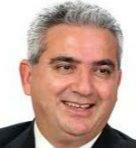
Civil Society (CS) is the direct way in which citizens express themselves and participate in consultation before making a decision in a state. It is an additional structure in the whole organizational chart of the rule of law with a complementary role to that of the executive and the legislature. The manner, immediacy and degree of participation of the CS determine firstly the degree of democracy and secondly the level of effectiveness of the rule of law in each country separately. The institutionalized participation of the CS in the structures of the state and international organizations through consultation / dialogue is essential.
More specifically, states that have good practices in relation to CS participation operate more smoothly with enhanced democratic processes and vice versa, while states with lower CS participation lag behind, resulting in this significant absence of citizens from dialogue affecting their functioning.
The CS through its complementary role can also bring other powers and state structures face to face with the real problems that are a priority for society and man. A simple successful example is highlighting the global problem of climate change. The control of other state powers is a stabilizing factor of the rule of law. At the same time, the CS through its role can restore social justice and contribute to the selfregulation of the control of powers in a state. In particular, the participation of the CS can have various purposes such
as for example as a defender of Human Rights and Freedoms within the rule of law by criticizing all the powers within it.
Particularly and proportionately important is the role of the CS in international organizations which should be role models through their own operation. I observe that the UN Secretariat, the Council of Europe and the EU, even with different structures, have the inclusion of the CS in an ongoing dialogue. In the case of the OSCE, there is a lot of work to be done, since, at the governmental level, there is still no compromise on how the CS can participate in its work. The OSCE General Assembly has appointed a special representative for the CS, who will prepare a report on the good practices of the CS in the Member States and a mechanism for participating in the work of the assembly.
There is no fixed and universal way of utilizing the CS by the states, which apply differently the participation of the CS in their wider organization. Others have institutionalized the inclusion of the CS in the wider state structure, while others have not. Unfortunately, some states, even if they refer to the CS, in their day-to-day operation the CS does not receive the appropriate respect.
The organization of the CS varies from state to state. Some examples of expressive Institutions for CS are the ombudsman, the Commissioner for Legislation / Human Rights, etc. Institutions that have a different degree of independence from other state powers, while also having a different role. In relation to the above, the expression and organization of the CS through NGOs varies from country to country where we observe models
of enhanced cooperation between NGOs, while elsewhere NGOs operate completely uncoordinated between.
In addition, digitization as a technological development makes the participation of the CS much easier and financially painless. Online meetings facilitate dialogue, discussion and consultation, especially for all those Non-Governmental Organizations (NGOs) that have limited financial resources and human resources. In addition to the fact that teleconferences enrich the knowledge, relationships and collaborations of CS. Unfortunately, there are many states that even impose prosecutions on the CS under the pretext of national security, crime, the imposition of a state of emergency, but also the instrumentation of different national laws in order to prosecute CS defenders. Regarding the latter, there is a particularly large number of people from NGOs who are prosecuted after tax audits or other minor offenses in order to be blackmailed and not to play their role.
The orderly and legal activity of NGOs is a necessity so that their activity does not run counter to the rule of law. The main reason why a number of NGOs are treated with great caution by the states is the illegality of their activities. A number of NGOs involved in illegal economic and political activities give rise to states and international organizations refusing to integrate them into their decision-making processes. Once their legitimacy has been verified, then the state should fully respect the operation of NGOs as a separate institutional cell of democracy.
Some states keep a register of NGOs based on which an NGO is registered.
A number of states also require the inclusion of a code of conduct and ethics in the statutes of NGOs. However, it should be emphasized that the criteria applied by the states need a comparative study, in order to determine whether and to what extent irrational and unnecessary obstacles are imposed in the registration of an NGO or not.
In conclusion, the participation of the CS necessarily contributes to democracy and the rule of law and, consequently, to peace. The aspect of CS participation should be highlighted as a priority for both states and international organizations. The development of good practices for the integration of CS into the processes of states and international organizations is essential. After all, the CS has significant reserves of “calm” power that can positively influence the agenda and rules of national and international policies. ■
* Dr. Hatzigiannis is Special Representative for the participation of Civil Society in the Parliamentary Assembly of the Organization for Security and Co-operation in Europe (OSCE). He also served as Chairman of the Committee on Democracy, Human Rights and Humanitarian Affairs of the OSCE. Furthermore Mr. Hadjiyiannis Is ViceChair of the ad hoc Committee on Migration of the Parliamentary Assembly of the Organization for Security and Co-operation in Europe (OSCE).
EUROPEANTIMES.NEWS • MAY 2022 15
Third Committee Meeting, Vienna, 20 February 2020 . Photo credit: (CC BY-SA 2.0) OSCE Parliamentary Assembly
“UNFORTUNATELY, THERE ARE MANY STATES THAT EVEN IMPOSE PROSECUTIONS ON THE CIVIL SOCIETY UNDER THE PRETEXT OF NATIONAL SECURITY ”
SUSTAINABILITY, PLASTIC POLLUTION AND THE PANDEMIC: WHERE DO WE GO FROM HERE?

When COVID-19 arrived in early 2020, eco practices went to the back of people’s minds. Sustainability became a much less important word than survivability.
By Juan Sánchez Gil
Fast forward 2 years later. The mountain of waste humanity created to combat illness will live on for hundreds of years. Disposable masks, single-use vinyl gloves, single-use takeaway clamshells, synthetic sanitizing wipes.
These are grim plastic reminders of what we used to protect ourselves from the virus. Littering the Earth, swimming in the oceans. In 2020, researchers tallied over 1.6 billion disposable face masks ending up in our oceans.
Plastics are forever?
Plastics can take over 450 years to decompose in a landfill setting. Global plastic recycling rates currently hover in the 10-15% range. While we worry about BPA-free, over 50,000 unknown compounds exist in plastics used daily. These compounds leach out as plastics break down in landfills and the environment.
Microplastics are tiny pieces of plastic smaller than 5 mm in length. Researchers in the UK recently discovered microplastics in live, human lung tissue. David Attenborough’s documentary chronicled wildlife’s struggles with plastic in the oceans.
With the rise of such alarming reportswhere do we go from here? Plastics are so convenient, so useful in modern day, how do we escape from them?
The refill revolution
Small refill shops abound in Europe, the UK, and even more in the United States and Canada. They hearken back to old general stores. Where personal service by the proprietor gets you your goods. Today these shops allow customers to refill their own bulk goods. Customers bring in a container to refill. The container weight gets recorded, then the container gets filled up. At checkout, the weight of the (empty) container gets deducted from the total.
In such a way, eco-minded folks can get package-free grocery staples. Rice, beans, pasta, chips, tofu, cheese, fruits and vegetables are all available. Many stores specialize in only personal grooming and household care (shelf stable) items. Fill up on shampoo, conditioner, laundry soap, even package-free deodorants.
Refill stores have their detractors. Some complain the experience is too manual, too slow, and too expensive. Shop owners defend their pricing by explaining their sourcing benefits. Locally made, organic, fair trade, women-made, employee owned.
Independent refill shop owners lack the economies of scale larger retailers have. Each store owner must order small
amounts to fit their store size. Massive retailers such as Aldis, Sainsbury’s, Target, Walmart, Costco have a size advantage. Larger stores can use their buying power to dictate pricing discounts.
Waterless world?
Product brands are inventing “waterless” concentrated solid products that straddle many retail worlds. These solid products throw out the concept of transporting water-based liquids. Packaging is paper-based (biodegradable). Not only less water in the product itself, but no water used to create the plastic bottle. Plastic bottle manufacture requires 3 times the amount of water as what is in the bottle itself.
Denttabs® GmbH in Germany debuted a solid toothpaste tab product with fluoride. Eco minded shoppers still listen to the dentist for advice on teeth health. It is a top product both in Germany and abroad and packaged in a compostable bag. Chemical manufacturers
Jungbunzlaur and Ashland released guides on making similar products.
No Tox Life, manufacturing in the United States, launched the Dish Block®, a solid version of dish soap. It makes a lather when rubbing a sponge on the bar and degreases the dishes. It is an online bestseller and appears in hundreds of refill shops. Packaged in a paper box for transport.

LUSH is a well-known UK-founded company with branches globally. Solid shampoos, body wash solid bars and other waterless products. BubbleBar®, a solid bubble bath product, is a top seller. Each package is paper or with a reusable plastic tub. They use a discount program to encourage tub return.
Plastic problems solved?
Unfortunately the private sector innovations, while important, are not enough. The tide of plastic waste in our environment continues to rise.
From here, our leaders and policy makers need to be aware of the statistics and research. They need to understand the dangers to human health and less privileged populations.
Start by asking questions - where does the plastic go? Does recycling work? Who takes unwanted recycling? Why is plastic ending up in the oceans? Must everything come in a plastic bag or container?
We need brave leaders to take on these challenging environmental topics. The anti-plastic waste lobby is tiny and under-funded. There will be no special speaking engagements or private dinners. But the health and safety of humanity and our planet hangs in the balance. ■
16
ENVIRONMENT
“OVER 50,000 UNKNOWN COMPOUNDS EXIST IN PLASTICS USED DAILY” THE EUROPEAN TIMES • MAY 2022
Faustino
development of the Russian and outside the country transform. They attempt through unity. But, there were already wounds in Ukrainian society before the war.

The person interviewed for this article prefers to maintain anonymity.
The war is lasting much longer than expected; long enough to show its impact on Ukrainian and Russian societies. As a result, the world dramatically changed for the people of Ukraine and Russia in a matter of weeks.
Ukrainians now face a homeland damaged by the war. They face a refugee crisis. And at the same time, the country reaffirms its existence against the invaders. Concurrently, the Russians are now facing a country in a desperate financial situation. Russia is now an international pariah.
“The hate sentiment towards Russians is growing stronger and stronger with each day of the war. This is so, especially after Bucha, Mariupol, and lately Kramatorsk.”, says a Ukrainian immigrant living in Portugal.
He explains that “in the beginning, there was the sentiment that it was not the fault of the Russian people, that they were victims of Putin’s regime too,” said my source. “But as time went by, and as we continue to see in the opinion polls regarding the
war, the lack of protest, and the complete disregard for all the crimes Russia is committing...”
Ukrainians are now just “angry” and “sad”, and Russians are increasingly using “racial slurs towards Ukrainians.”
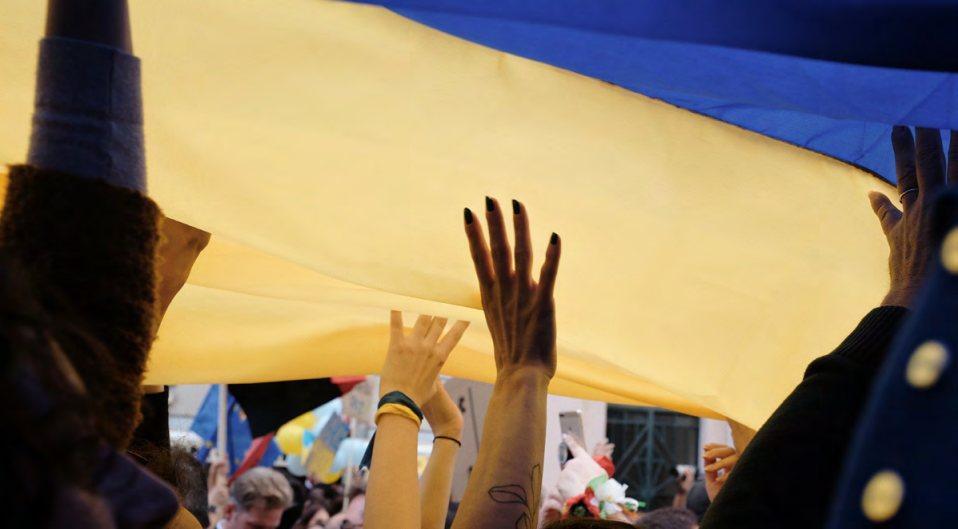
There is a tone of frustration, as the Ukrainian citizen says, that there are “Russians putting Z-symbols on their cars, and calling the police over “treason” because their neighbour put up a Ukrainian flag on the window, instead of blaming the government and Putin for starting the war”.
This ongoing and everyday hotter debate about the division between pro-Russia and pro-Ukraine reminds him that “following the annexation of Crimea, there were many people who interpreted the war differently. The people who got their news from Russian sources in 2014, clearly, don’t support Ukraine and believe Russia’s propaganda. It’s a minority, but those people still exist.”
He says that those people want Ukraine to surrender and a Russian victory, as they are promised an “economic miracle” by the propaganda.
The tension between proUkraine Ukrainians and proRussia Ukrainians is reportedly increasing. “If it’s inside families, then there are arguments and extremely heated debates. But, outside this circle, the proRussia Ukrainians must conceal their views.”
About the pro-Ukraine Ukrainian community, he mentions that Ukrainian emigrants: “have a feeling that they can’t do anything”. That they try to help mainly through volunteer centres that ship basic necessities to Ukraine. And he doesn’t forget those who go fight in Ukraine or send money to the army. Yet, there are many who “do nothing” because “they don’t have the time” or money.
Responding to the question, “Do you believe that a Ukrainian victory is possible?” He said
that people are now more motivated to fight than ever, as the initial shock is over, and so he believes that a “Ukrainian victory is highly possible.”
“People in Kherson, despite the occupation by Russia and repression by soldiers, still protest every Sunday.”
He states that there is a “growing sense of national pride and healthy patriotism” and a “renaissance of Ukrainian culture, language, and art.”
“Many Youtubers are now speaking Ukrainian instead of Russian”, and “even I switched my phone language to Ukrainian.”
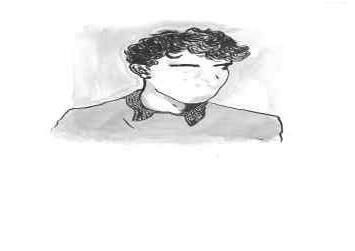
For now, he only fears the possibility that “despite popular discontent, Russia could order general mobilization, and simply flood Ukraine with soldiers.”. This would most likely expand the conflict as a consequence. This may be very improbable, he says. “Because one thing is to say that you support the war, because Soloviev [a popular Russian TV host] says so on TV,
and it is something else having to go yourself or sending your son and husband to the war.” said my source.
Regarding the treatment of Ukrainian emigrants receive since the war, he points out that “people are quite nice.”
“They ask me about my family and my overall well-being. It makes me feel quite better when I go around the city and see Ukrainian flags all over the buildings.”
He also states that in Portugal, the war has united the Ukrainian community. “People in Facebook groups have been helping the refugees and each other.” They now feel like they “are not alone and that the world is on our side”. ■
“THE PEOPLE WHO GOT THEIR NEWS FROM RUSSIAN SOURCES IN 2014, CLEARLY, DON’T SUPPORT UKRAINE AND BELIEVE RUSSIA’S PROPAGANDA”
OPINION
THE VIEW OF AN UKRAINIAN EMIGRANT
17EUROPEANTIMES.NEWS • MAY 2022
OPINION
FROM THE EU’S AIM OF PEACE TO EUROPEAN CITIZENSHIP
 By Angelo Lamberti
By Angelo Lamberti
Since 1950, Europe has developed its own brand of peace. The European communities were not born as the United Nations, as a fully formed machinery of peace. Instead, as Robert Schuman had recommended, they grew out organically and without a single plan, “through concrete achievements which create a de facto solidarity”. What emerged decades later, in 1992, was a European Union of states, which established a system of peaceful coexistence among its member-states.
Yet, has the EU truly achieved a union of its citizens? Part 2 of the Treaty of the Functioning of the EU establishes a European citizenship, with passports and civic rights; citizenship remains, however, largely an administrative notion. According to Eurobarometer, no actual “European public opinion” has emerged yet, as evidenced by the wide differences of perception by country.
Of course, creating a moral citizenry of the EU with a sense of loyalty and belonging to a ‘European common home’, does present a formidable set of challenges. One temptation would be to turn to the traditional nation-state model, built on a common language, a common culture, and the awareness
of a common past, often exalted by a fight for independence against a foreign empire. Those methods of nation-building were applied in the late nineteenth century and early twentieth century in all countries from France, Italy and Germany to Bulgaria and Romania. They relied on centralized education systems to homogenize the population by teaching one language in schools and by discarding others; they called for teaching a national history that glorified heroes (who were often military commanders).
Some attempts have been made, here and there, to reinvent a “European identity”, as a resistance fight against foreign invaders, allegedly Muslims enemies of Christianity. Such an identity would be contrived and controversial in the EU bloc, which is a supra-national entity with 24 official languages. This is not only because the historical existence of such a fracture line is highly dubious. Its primary liability is that it would introduce a normative definition of European citizenship based on religious affiliation or tradition. Taking that route would be plainly in contradiction with the EU’s values of diversity and nondiscrimination and would violate the Charter of Fundamental Rights. It would also create a foreign policy problem in the EU’s neighbourhood: it would encourage ideological hostility against Turkey and neighbouring countries in Northern Africa and the Middle East, which would be incompatible with the pursuit of peace.
Indeed, the legal and administrative makeup of the EU aims to prevent the repetition of the evils of World War II, which were, in the words of Winston Churchill: “frightful nationalistic quarrels (…)
which we have seen (…) wreck the peace and mar the prospects of all mankind.”
Furthermore, introducing a European identity would clash with the bloc’s motto United in Diversity. That term ‘identity’, taken literally, would imply that all Europeans should have common cultural or ethnic characteristics that set them apart from all other people of Earth and defines them against the rest of the world. In that case, which language, cultural norms, and physical traits should be selected as quintessentially ‘European’? Enforcing such standards could become an arbitrary act that would smack of ‘Brussel imperialism’ since it would violate the national identities of the member-states. Indeed, Robert Schuman stated in 1949: “But Europe cannot wait for definition, for the end of that controversy; she does, in fact, define its boundaries by the will of its peoples.”
This has occasionally led to the belief that the EU suffers from an identity deficit. The problem could be, however, with the concept of identity itself. Could there be a better way to create a sense of shared belonging that does not rely on a common, pre-existing ‘identity’?
I believe that, yes, that should be possible. The alternative would be to forge a European conscience as a grass-root movement, which would be based on the EU’s aim of peace and its set of common values, which are not in the past but in the present and future. A commonly accepted definition for European conscience is “the awareness of the necessity to make Europe (in a political sense)”, and therefore to avoid future wars on the continent. This is something that might require extending the mantle of Pax Europeana further east, to countries such as Ukraine and the Republic of Moldova.
Needless to say, the real challenge would be to make that European conscience accessible to every European citizen of every country and social group. That would require a concerted effort at public outreach, as well as education of the new generations on the aim of peace.
The EU’s aim of peace is so powerful that it seems paradoxical that it has been neglected for so long in the communication from the EU to its citizens.
Experience demonstrates that a history lesson with images of the ruins of Warsaw or Berlin in May 1945 could be sufficient to convince a young audience of why the European construction process had to be started in 1950 Similarly, the bombings of Mariupol or Karkhiv in 2022 are the best evidence of why the continued existence of a European Union remains the best guarantee of peace for half a billion people on this planet. ■
“Of course, creating a moral citizenry of the EU with a sense of loyalty and of belonging to a ‘European common home’, does present a formidable set of challenges”
“The alternative would be to forge a European conscience as a grass root movement, which would be based on the EU’s aim of peace and its set of common values, which are not in the past, but in the present and future.”
18 THE EUROPEAN TIMES • MAY 2022
WHY LEGAL PROFESSIONALS IN EUROPE STILL AVOID OUT-OF-COURT PROCEDURES?
By Veneta Manolova – Draganova Lawyer (Sliven Bar Association, Bulgaria) and registered Mediator

Over the last years, we have witnessed events that we only know from history books. Our European culture has been confronted with what is happening. The ugly truth is that primary reactions are not alien to us. We are born with them; just over the years, we have learned to suppress primitive emotions and behave properly because we live in society. We’ve learned to use common sense focused on negotiation, compromise and agreements.
In political language - this is diplomacy. In legal language - these are out-of-court procedures or mediation
As we all know: “Even the worst agreement is better than the best court decision.” – a wellknown statement among lawyers. Then why do legal professionals still avoid mediation? Is the problem in legislation, or is it in our agreement culture?

According to Article 1 of Directive 2008/52 of the European Parliament and of the Council of 21 May 2008 on Certain Aspects of Mediation in Civil and Commercial Matters, 2008 OJ (L 136), its main objective is “to facilitate access to alternative dispute resolution and to promote amicable settlement of disputes by encouraging the use of mediation and ensuring a balanced relationship between mediation and judicial proceedings .”
Since 2008, many studies and analyses have been carried out, and all of them show that the practical application of the Directive is far from the objectives set. Some of the studies that should be noted are:
“Quantifying the Cost of Not Using Mediation - a Data Analysis” (The 2011 Study and “The 2014 Rebooting Study”, both commissioned by the European Parliament. These studies estimated that if all cases in the EU went to mediation first, and the procedure succeeded in 50% of cases, the average number of days saved would be 240 days; if mediation succeeded in 70% of the cases, time savings would increase up to 354 days. As to cost savings: money savings per single dispute were multiplied by the number of disputes in the EU annually, resulting in savings of around thirty to forty billion Euros at a 50% success rate. Despite these impressive data, the European Parliament passed its Resolution of 12 September 2017 on the implementation of the EU Mediation Directive, saying that the objectives stated in Article 1 have not been achieved, as mediation is used in less than 1 % of the cases in court on average in the majority of Member States. Later in 2018, a Briefing requested by the JURI committee of the European Parliament was published, according to which we are witnessing the “EU Mediation Paradox”: “If increasing the use of mediation brings significant time and cost savings to the parties (as well as the judiciary and taxpayers), why were the Member States experiencing suchlow rates of mediation?”
The answer to this question is quite complex. The reasons for this paradox are not so much legal but psychological and cultural. My observations, from my experience so far, overlap with some of the conclusions of the cited studies and we can summarize them as follows:
1. Introduction of mandatory mediation is crucial for the successful implementation of mediation.
It turns out that when Member states have the freedom to choose whether to apply mediation, they simply do not. And I believe it is an understandable psychological reaction. Italy is an example of the fact that after the introduction of mandatory mediation for a certain range of cases, the demand for voluntary mediation has sharply increased (150.000 – 200.000 mediation cases per year). In Bulgaria, we have had The Mediation Act since 2004, long before the adoption of the EU Mediation Directive. Since then, a small group of experienced mediators have been trying to break stereotypes and implement mediation at the national level. In 2018, there was a breakthrough with the Round table on Mandatory Mediation, organized by the Supreme Bar Council and the Center for Agreements and Mediation at the Sofia District and Sofia City Courts, which had a serious public response. But only in 2021, The Panel of Judges of the Supreme Judicial Council adopted a Concept for the Introduction of Mandatory Judicial Mediation in civil and commercial cases in Bulgaria.
2. Financial incentives for participation in the procedure / Relative sanctions:
Introduction of anything new is much easier to be accepted if tied to financial incentives or related sanctions. For example, in Bulgaria, the parties receive a refund of 50% of the state fee paid to the court if they successfully resolve the dispute through mediation. Romanian law provides a full refund of the court fee if the parties resolve a pending dispute through mediation. Similar provisions can be found in Hungarian law and also in Italy, where all acts and agreements resulting from mediation are exempt from state fees. As for sanctions, they seem to be the most sensitive topic at this stage because we risk affecting human rights and access to justice.
3. Increasing the criteria for licensing mediators
At the moment, I consider this a deficiency, as the criteria are too general, and this is why many judges in countries where mediation is not mandatory avoid the procedure because they doubt the effectiveness of the procedure and/or the qualifications of the mediators. Therefore, I believe that regulations regarding the requirements for mediators should be specified, and access to this profession should be tightened. Here we should mention the good example of Romania and their Mediation Council - a national body fully dedicated to promoting mediation, developing training standards, training of teachers who provide training, issuing documents proving professional qualifications of mediators, adoption of a code of ethics, as well as formulation of proposals for legislative acts.
4. Cooperation with lawyers
Unfortunately, in many European countries, lawyers still avoid mediation, as they believe that out-of-court dispute resolution will deprive their income from litigation. In order to overcome this problem, it is extremely important that National Bar Associations work towards increasing the competence of lawyers. Lawyers need to be reassured that mediation will not throw them out of the market but will give them new opportunities as the participation of lawyers in the mediation procedure is crucial. Recall that even in Italy, legal practitioners opposed the changes, appealed legislation in court and even went on strikes.
5. Clarification of the obligations of Enforcement Agents
In 2021, The CEPEJ (European Commission for the Efficiency of Justice), at its 36th plenary meeting, adopted a Mediation Awareness and Training Programme for Enforcement Agents, which aims to ensure the efficiency of the Judicial Referral to mediation. I fully share the opinion stated in the Guidelines of the Council of Europe’s recommendation on enforcement, according to which the enforcement agent’s role should be clearly defined, by national law, in order to avoid confusion in competencies and procedures. Enforcement agents are expected to take on the role of “post judicial mediator” during the enforcement stage. But the imposition of this role must be communicated in detail and in advance. Otherwise, we risk the opposite effect of which enforcement agents might withdraw from mediation, just like other legal professionals mentioned above.
6. Improving the legal culture of society
The introduction of European regulations and legislation, in general, is moving from top to bottom, which is normal. But this often leads to a problem with their implementation in practice. In my experience, I always take the opposite approach - individualize the problem in its infancy and formulate a solution. For example, I think we cannot talk about mandatory family mediation if we have not made progress in solving the problem of domestic violence. Issues need to be prioritized, especially in countries with a lower standard of living, as well as in societies whose culture is initially more militant.
In conclusion, it turns out that, even if we have a great regulatory framework that aims to make our lives easier, regulations will be inapplicable in practice until we apply an individual bottom-up approach – starting with individuals, through legal professionals up to national and European institutions.
So, do we fear mediation? Not anymore. But do we have an agreement culture? Not yet ■
Veneta Manolova – Draganova is practicing as a L (registered in The Ministry of Justice of the Republic of Bulgaria) in the field of commercial law and business mediation, with expertise in agricultural business sector and AML Policies of the European Union; Contacts: v.manolova@venetamanolova.com
19
MEDIATION
EUROPEANTIMES.NEWS • MAY 2022
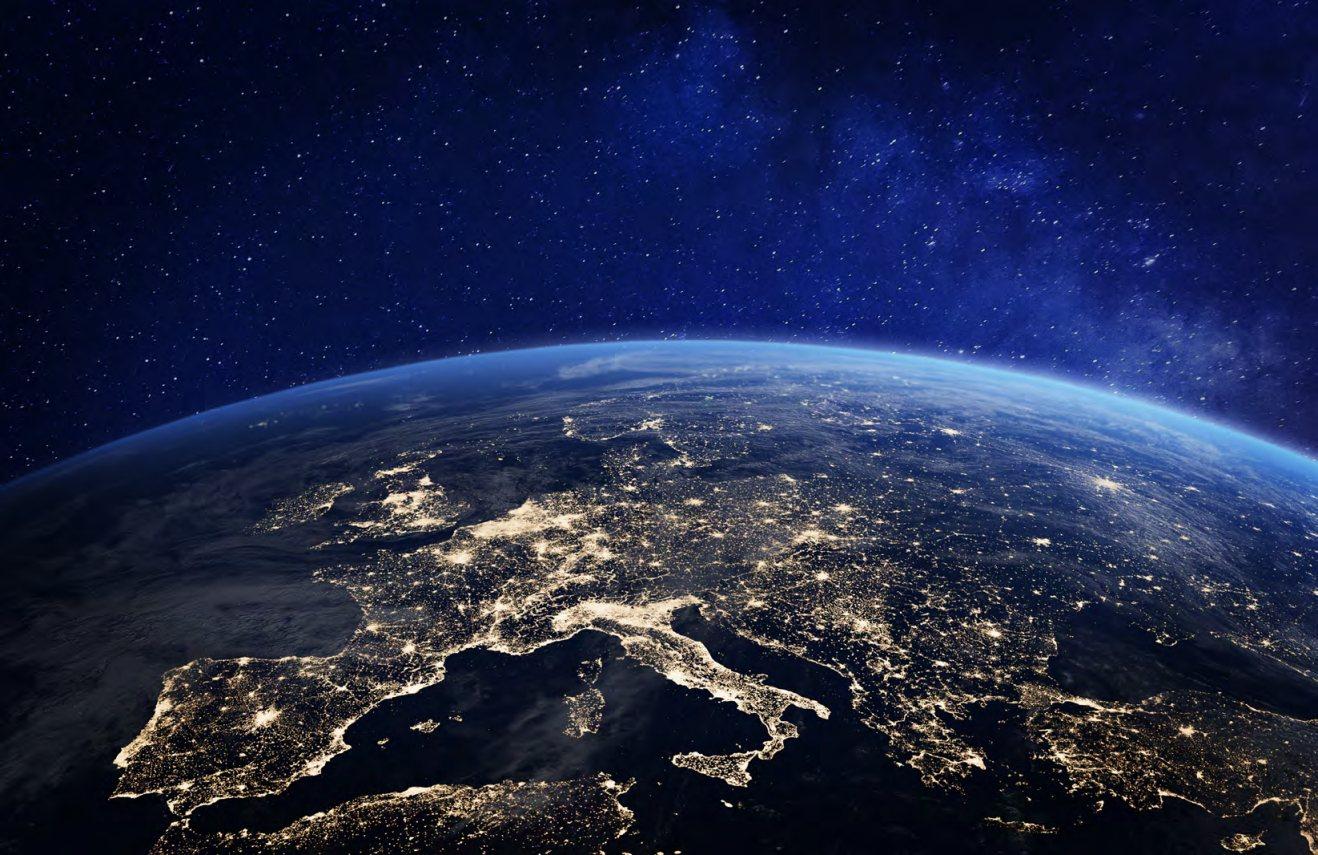



20 europeantimesnews europeantimes_ europeantimesnews







 Photo by Martin Bekerman on Unsplash
By Petar Gramatikov Chief Editor
Photo by Martin Bekerman on Unsplash
By Petar Gramatikov Chief Editor


















 By Dr. Kyriakos Hatzigiannis OSCE PA*
By Dr. Kyriakos Hatzigiannis OSCE PA*






 By Angelo Lamberti
By Angelo Lamberti





